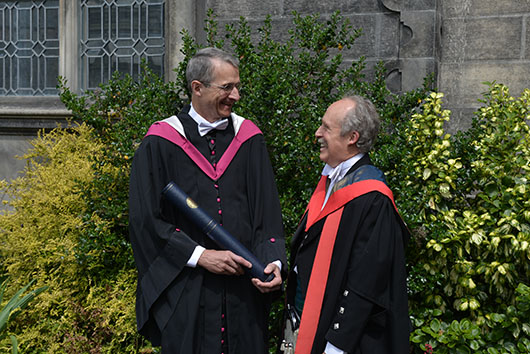Laureation address – Professor Richard Schrock
Professor Richard Schrock
Honorary Degree of Doctor of Science
Laureation by Professor David Cole-Hamilton
School of Chemistry

Honorary graduate Professor Richard Shrock with Laureator Professor David Cole-Hamilton.
Vice-Chancellor, I have the honour to present for the Degree of Doctor of Science, honoris causa, Professor Richard Royce Schrock.
Dick Shrock is a chemist who has won so many prizes that it is impossible to list them. However, they were all capped by his being awarded the Nobel Prize for Chemistry in 2005 along with Bob Grubbs and Yves Chauvin for their work on olefin (or alkene) metathesis. More of that in a minute.
Dick carried out his PhD at Harvard under John Osborn, an expatriate Englishman. He then moved to Cambridge to work with Jack (now Lord) Lewis, followed by three years at the Central Research and Development Department of EI duPont de Nemours and Company in Wilmington, Delaware. Finally he moved to MIT in 1975, where he is the Frederick G Keyes Professor of Chemistry.
Carbon atoms like to be attached to four other things, the archetypal example being methane where the carbon atom is attached to four hydrogen atoms to form a tetrahedron. Sometimes, two carbon atoms join together forming two bonds to one another and they are then only attached to two other things. These are the olefins or alkenes I mentioned earlier. An example is ethylene, which you come across every day when it has been turned into polyethylene (polythene). At DuPont, Dick Schrock was working on making carbon compounds like methane but where one of the hydrogen atoms was replaced by a metal. He made a number of these so-called metal alkyls, but one day, much to his surprise he found that a further reaction had happened and he now had a compound with two bonds between the carbon atom and the metal. These types of compounds called carbenes were known, especially from the work of EO Fischer in Munich, but they normally needed an oxygen atom nearby to stabilise them. Schrock’s didn’t and they proved to be much more reactive and this is where metathesis comes in. They are now called alkylidenes or Schrock carbenes.
Normally, alkenes are very unreactive especially towards one another, but Dick showed that if you stick his type of metal carbene in with a mixture of alkenes, their ends swop over and you get new alkenes. This happens under very mild conditions and proves to be a tremendously important way of making new molecules. Alkene metathesis is now being used in so many areas of chemical manufacture from materials for insulation foams to sophisticated antibiotics.
Now, I want to show you how this metathesis business works. I’m going to ask my two friends, Pierre Dixneuf from Rennes and Luis Oro from Zaragoza to come out and help me. They are going to be an alkene holding both hands to show that they have two bonds between the two carbon atoms. Dick Schrock and I will be the Schrock complex or catalyst containing the metal attached to carbon by two bonds. Schrock is the metal and I am the carbon. Dixneuf and Oro, the alkene, can bump into other alkenes like them and nothing will happen, but as soon as they hit the Schrock complex, remarkable things happen; one of each of the double bonds breaks, allowing a ring to be formed. Now, if I let Dick go and join my second hand with Luis while Pierre does the same with Dick we have a new alkene and a new Schrock carbene. This can happen over and over again so the ends of the alkenes can be swapped.
The discovery of compounds that could do this very effectively won Dick Schrock the Nobel Prize.
I’m sure you did not come here to learn about chemistry especially not our Chemistry students who are graduating today, whom it has been a delight to teach and whom we shall miss greatly now they are moving on. Thank you for all your hard work and many congratulations on your great success.
Dick Schrock is a very hard worker; the time difference between Boston and Stockholm is such that the call from the Nobel Committee came at 5.30 in the morning. Schrock was already up, although still in his dressing gown and slippers. His wife Nancy, whom it is a delight to have with us today, brought him a celebratory cup of tea!
However, I would not wish you to think it was all work and no play for Dick. I remember once at a conference in Leeds very early in my career, Dick, another young American Turk, John Bercaw and I stayed up most of the night playing snooker and drinking beer. Dick won the snooker (he shoots a great game of pool to put it into a vernacular he might recognise more easily) and was bright and shiny in the morning – unlike some of us.
More recently, when being presented for an honorary degree in Zaragoza (Luis Oro’s home territory) the Rector Magnificans in an outfit like Luis’s but in a rather sinister looking black, accidentally referred to Dick as Professor Shrek. Dick went around afterwards greeting people as “I am Professor Shrek – good morning!”
Vice-Chancellor, in recognition of his outstanding contributions to chemistry, especially his work on alkene metathesis, I invite you to confer the Degree of Doctor of Science, honoris causa, on Professor Richard Royce Schrock.
Category Awards